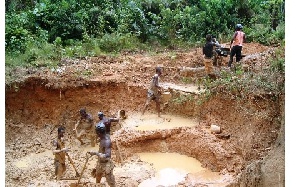Mr Arthur Owusu, Eastern Regional Manager of the Forest Services Division of the Forest Commission has expressed concerned about the threat of illegal mining activities to the forest reserves of the country.
He said Ghana’s forest reserves continue to dwindled at a fast rate and if measures are not taken to curb the current rate of deforestation, Ghana would lose its forest resource in the next 23 years.
Mr Owusu has therefore appealed to all stakeholders to join hands to flush out the illegal miners and other illegal forest activities to save the nations forest from collapsing. Mr Owusu expressed the concern in a presentation made on his behalf at the Eastern Regional forestry forum to promote good forest governance through information sharing, education, dialogue and advocacy at Koforidua.
The forum was organized by the National Forestry Forum-Ghana (NFF-G), a grassroots civil society organization that seeks to protect the nation’s forest belt from degradation. Mr Owusu said it was unfortunate that forest reserves in the country had been stripped bare of vegetation, with the lands losing their top soils and left with deep underground uncovered water pits.
He said in the Eastern Region, the activities of illegal mining operations had affected several forest reserves including Kwekaro forest reserve in the Birim North district. Mr Owusu said his outfit had collaborated with the security agencies to flush out the illegal miners and called for concerted efforts from all stakeholders.
He said illegal lumbering, illegal farming, bush fires and activities of fulani herdsmen were all causing rapid dwindling of the nation’s forest reserves. The National Coordinator for National Forestry Forum-Ghana (NFF-G) Mrs Doreen Asuman-Yeboah said the rate at which Ghana’s forests are disappearing rapidly, is worrying.
She said to avert this, Ghana signed unto the Voluntary Partnership Agreement (VPA) in 2009 which is a bilateral agreement between the European Union (EU) and wood exporting countries, with the aim to improve forest governance and ensure that the wood exported to the European Union Countries, had complied with the legal requirements of the partner country.
Mrs Asuman-Yeboah said although the success of the implementation of VPA depends to a large extent on grass-root stakeholders’ participation especially the communities, however, this could not be achieved with low capacity and knowledge about the process.
She said it was in this regard that NFF-G in partnership with World Wide Fund for Nature (WWF) is implementing a project “Facilitating multi-stakeholder dialogue on illegal logging and VPA in Ghana”.
Mrs Asuman-Yeboah said, the project which is funded by the European Commission (EC) is being implemented in the High Forest Zone and involves sensitization of 30 communities, organization of 10 districts, 5 regions and a national forum on forests.
Business News of Sunday, 18 May 2014
Source: GNA













